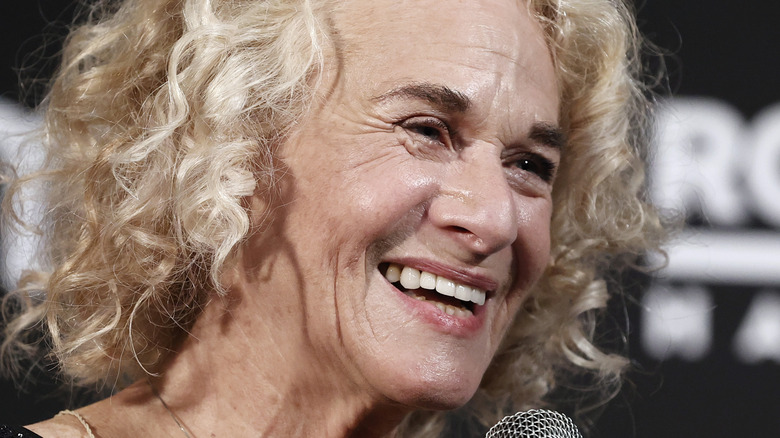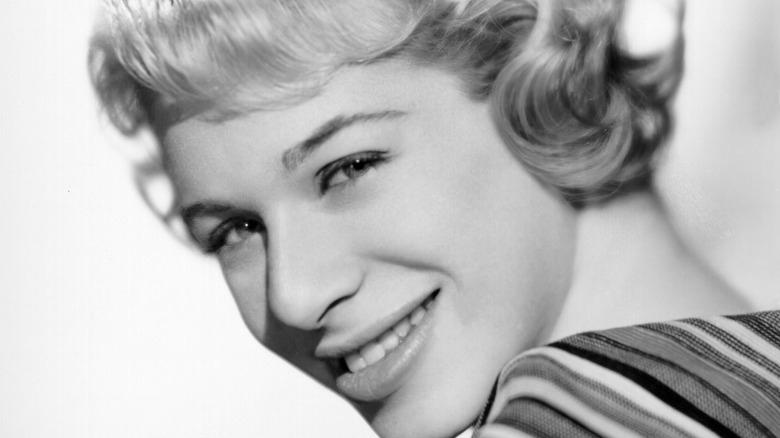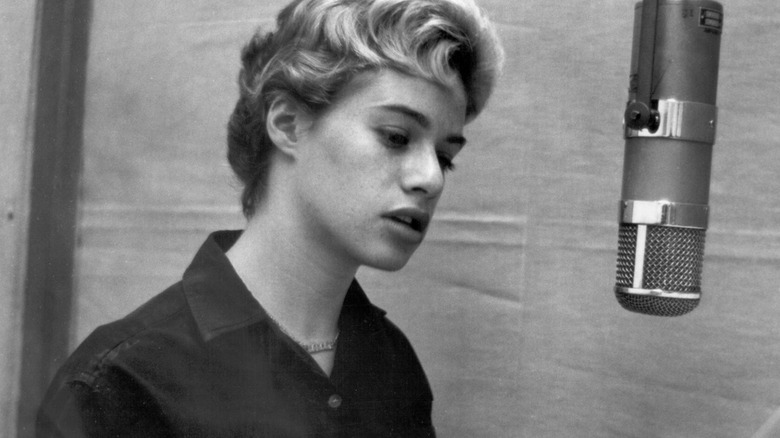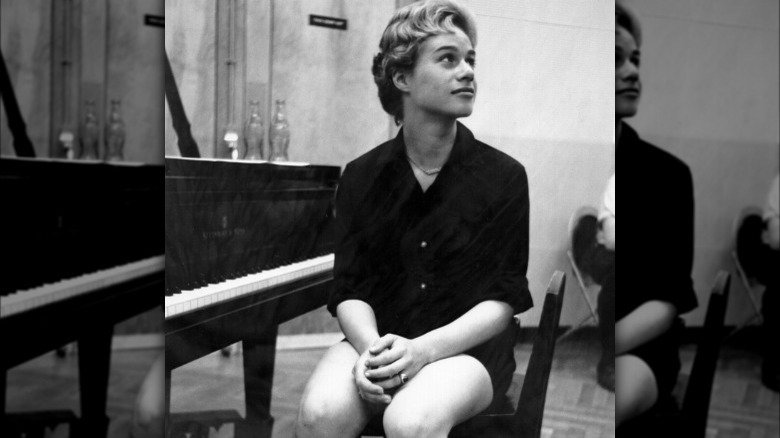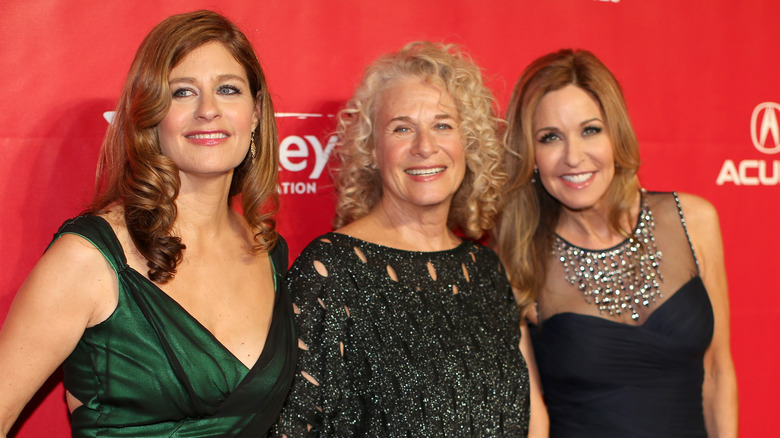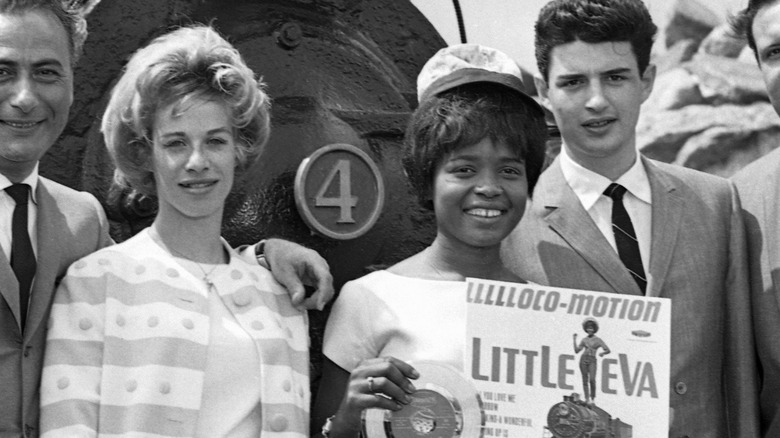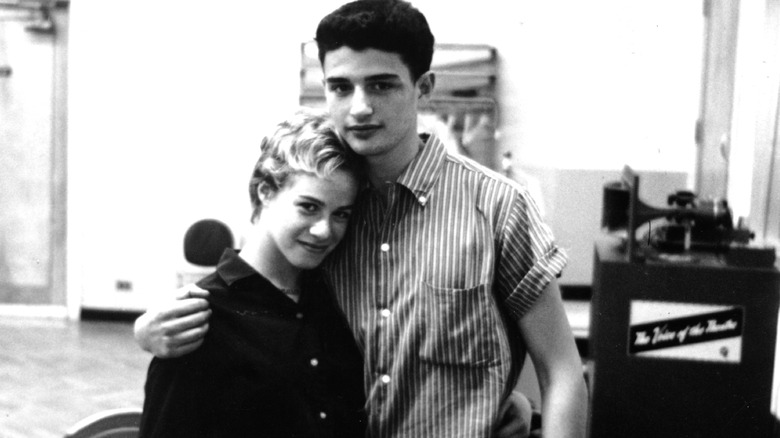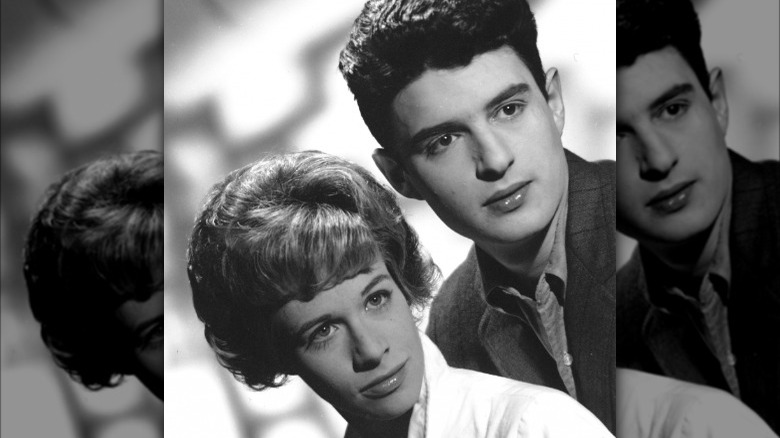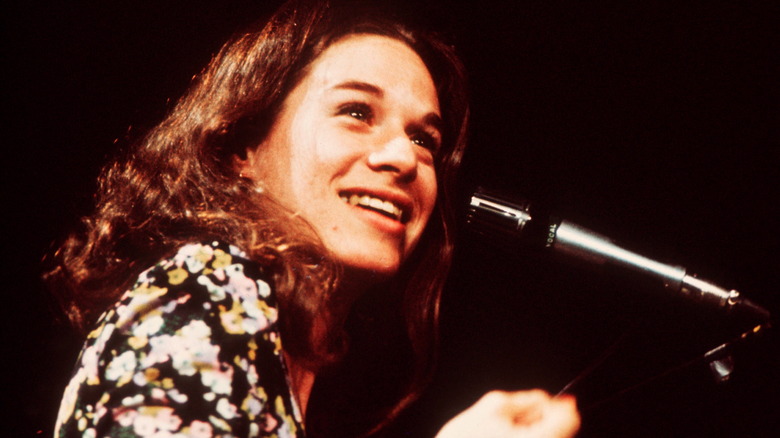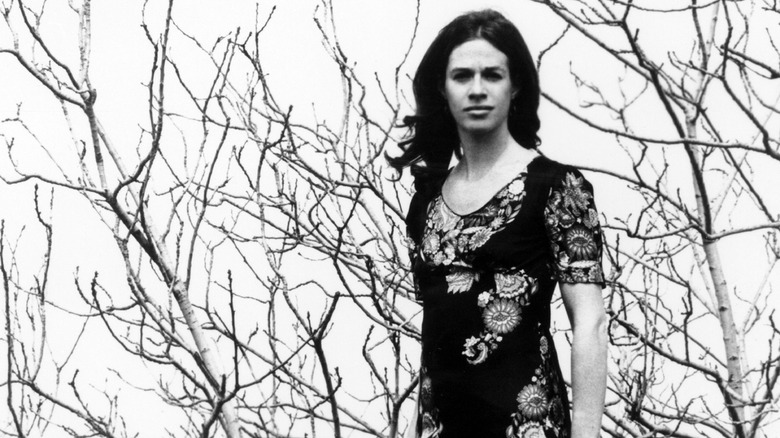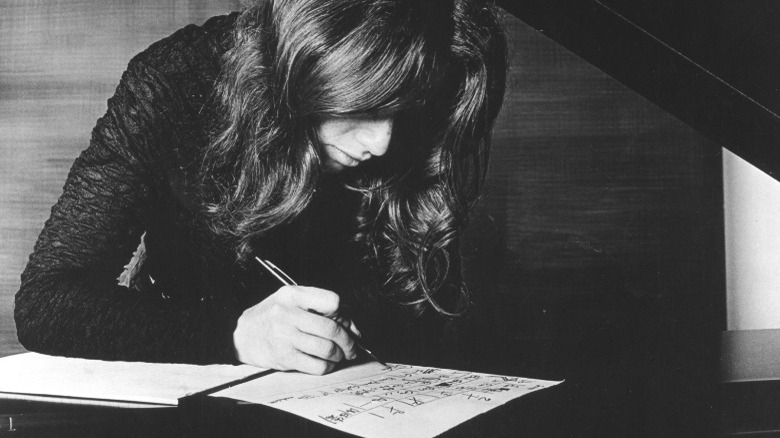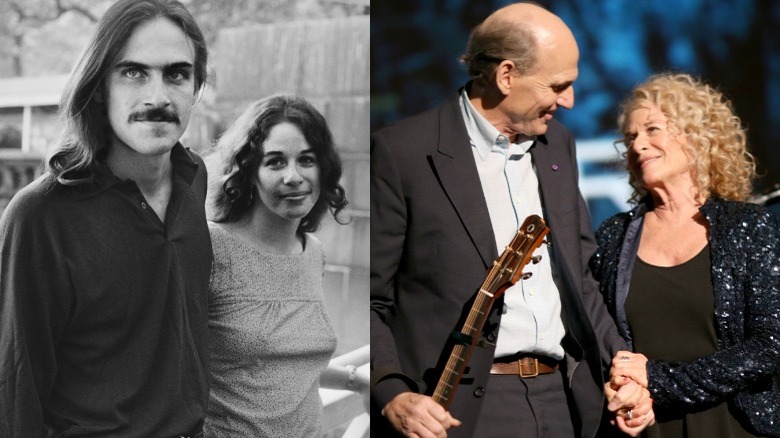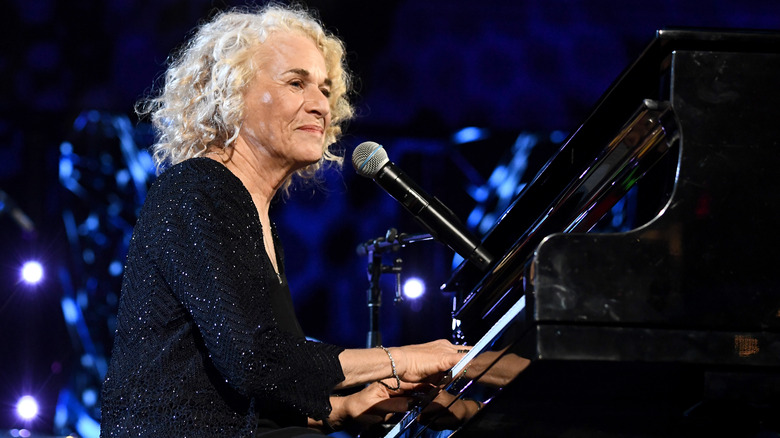Heart-Wrenching Details About Carole King
Some people contribute to their field, and some people shape it. The latter is precisely what Carole King has done over the course of decades as a singer-songwriter. Anyone who has their doubts can have them absolutely blown away by this shocking stat: According to Rolling Stone, listening to King's hits would take a whopping five hours ... and that's if your playlist only includes the songs that entered the Billboard charts. There's much more than that in her full catalog.
King has had a successful career as a singer, too, that included her breakaway album "Tapestry," which has sold millions of copies. Her career goes back decades, all the way to 1960's "Will You Love Me Tomorrow," co-written with her then-husband, Gerry Goffin. That was King's first big hit, according to the Academy of Achievement, and it was also notable for being the first song to catapult an all-female, all-Black group to a Billboard No. 1 spot.
From the Shirelles (who hit it big with that aforementioned chart-topper) to the Beatles, from the Drifters to Kylie Minogue, from the Monkees to James Taylor and even Mariah Carey — all have had major hits with songs penned by one wildly prolific songwriter who has had more than her fair share of challenges.
Her life was touched by World War II
Born in 1942, Carole King was very young during World War II. In her memoir, "A Natural Woman," she reflected that she'd been fortunate: She was well aware of the fact that, as a young Jewish girl, her life may have been very different if her grandparents hadn't decided to leave Eastern Europe for the promise of America when they did.
Still, her childhood wasn't untouched by the war. She remembered her father — whose status as an essential worker kept him from being drafted — risking his life every day as a firefighter, and her mother keeping things together at home. That included tending the family's Victory Garden, where some of King's earliest memories took place — including, she wrote, her earliest memories of singing and dancing. Those were the bright spots, though, and she grew up hearing tales of the atrocities in Europe: "As a Jewish child I had heard over and over how Hitler had annihilated six million Jews and nearly taken over the world in the forties," she wrote.
Her brother's disability introduced her to a cruel world
Things changed for Carole King's family in a big way when she was 9 years old. That, she wrote in her memoir, "A Natural Woman," was when her little brother was diagnosed as deaf and severely disabled. He was 2 years old at the time, and her family was faced with the heartbreaking decision to move him to an assisted living facility where he could get the care he needed.
King loved her brother fiercely, and when he was gone, she wrote about how she would lie awake and wish he was still in the room next to hers. She went nearly a year without seeing him, and although she always loved visiting him, she was acutely aware of the fact that he would never get to experience life the same way she did.
She also heard the whispers, recalling even friends and family members telling her mother that it was her own fault that she had given birth to a child with disabilities. She wrote, "Seeing my mother struggle with such hurtful remarks, I wanted to help. But I didn't know how." King also wrote that after her brother moved into the care facility, it was always her and her mother going to see him. Her father, she said, didn't visit him, ask about him, or speak about him. "I understood that he carried the additional burden of a father's failure to produce a healthy son," she wrote.
Carole King's parents split when she was young
Carole King has been candid about the upheaval she experienced in her young life, and her family changed again two years after she had to accept the departure of her beloved brother. She wrote in "A Natural Woman" that she was just 11 years old when her parents decided to take some time apart, and it came at the end of a series of fights that she witnessed, in spite of their attempts to hide what was going on.
It wasn't a clean break, and there was no immediate chance to adjust and move on. King says that her parents repeatedly got back together and tried to make the marriage work, divorcing, remarrying, and divorcing again amid other separations that happened throughout her teenage years.
King wrote, "When my mother and father started fighting, my mantra became, 'I just want everyone to be happy.' I had put so much time and hope in being able to keep my parents together, but I couldn't do it. I was just a child." It deeply impacted not only her childhood, but her adulthood, too. King says that it left her with a deep need to find her own home and family — one with a close-knit group of people who truly loved and supported each other — and would lead her into four marriages in an attempt to find what she had felt her life had always been missing.
She has talked about her struggles as a single mother
In 2012, Carole King sat down for an in-depth interview with the John F. Kennedy Presidential Library and Museum. Among the things she touched on was meeting her future husband and songwriting partner, Gerry Goffin, when she was just 16 years old. They wrote "The Loco-motion" the following year, and it was the same year they got married. At 18, she had her first daughter. "I was a child with children," she said.
That was around the same time that she and Goffin started having difficulties, and they separated while they were in the middle of a move to California. They ended up making their way to the West Coast separately, and King settled in Laurel Canyon. Finding her place there was difficult, though, as she was now a single mother in a place where there were few other single mothers.
Ultimately, King said, the challenges she and her children faced together wove them into a close-knit family. She's said, too, that she was grateful to have had her children with her during her Laurel Canyon years. While being a mom kept her from fully partaking in the free-wheeling, anything-goes culture that had famously sprung up in the Hollywood Hills neighborhood, it also kept her grounded. "Whatever happened around me, I always had that," she said.
She has a complicated relationship with one song in particular
Not every song can be a favorite. That said, there's one that Carole King isn't fond of at all: 1962's controversial "He Hit Me (and It Felt Like a Kiss)."
The song's story is a very real one. According to Rolling Stone, it started when Eva Narcissus Boyd (pictured above center, as "Little Eva") decided to leave her hometown in North Carolina for the Big Apple. Boyd ended up babysitting King's children, and she got her foot in the door when she recorded "The Loco-Motion," a song co-written by King. When King saw Boyd covered with bruises and asked her what had happened, Boyd told her that her boyfriend had hit her. King recalled her saying, "He really loves me," and that they would eventually get married.
King and her husband and songwriting partner, Gerry Goffin, put that sentiment to music, and the song got handed off to the Crystals, who sang it for producer Phil Spector. The Crystals, at the time, didn't want to record the song, and their misgivings proved right. No one bought it, no radio station wanted to play it, listeners complained about it, and Spector even axed the single. King would later tell NPR that even though she wrote the music and not the lyrics, and while she could see it as an explanation of trauma rather than an endorsement of violence, "That's one song I kind of wish I hadn't had any part of writing."
Facing mental illness with her husband
Carole King and Gerry Goffin were married at the height of their songwriting collaboration, but it was a marriage that forced King to face some difficult times.
In her memoir, "A Natural Woman," King wrote about the beginnings of Goffin's eventual downward spiral. According to her, it started when someone spiked his coffee with LSD, a drug he would continue to use. "He lost touch with reality at first for days, then for weeks at a time for many years afterward, with intermittent periods of lucidity, creativity, and wisdom," she wrote. She went on to recall his increasing paranoia and erratic behavior, and it eventually reached a point where King knew that she had no choice but to try to get help for him.
Goffin was initially handed a diagnosis of schizophrenia, but he was later diagnosed as manic. Amid a series of trial-and-error treatments, doctors asked King to give consent to try electroshock therapy. "I didn't feel that I had a choice," she wrote. "I signed the paper, left the facility, and cried all the way home." And she continued to carry that grief: When she first watched "One Flew Over the Cuckoo's Nest" 10 years later, she wrote that it showed her what she had given her approval to.
If you or someone you know needs help with mental health, please contact the Crisis Text Line by texting HOME to 741741, call the National Alliance on Mental Illness helpline at 1-800-950-NAMI (6264), or visit the National Institute of Mental Health website.
Carole King's husband was public about his infidelity
When Gerry Goffin died in 2014, Carole King's statement read, in part (via Rolling Stone), "Gerry Goffin was my first love. He had a profound impact on my life and the rest of the world." Although King added that she was grateful for their two daughters, the story of how their relationship ended is heartbreaking. After marrying and having children young, they divorced in 1968 — but not before staying together through Goffin's very public infidelity.
Rolling Stone says that among their early hits together was "Chains," recorded by a group called the Cookies. One of the Cookies was Earl-Jean "Jeanie" McCrea, who had an affair with Goffin and gave birth to their child in 1964. Goffin immediately acknowledged the child as his, even as fellow songwriter Jack Keller explained it away like this: "A guy may go on the road, producing, while his wife is home. You get what I mean? It's normal. Everybody does it — it's no big deal."
It was, however, a big deal to King (and to McCrea's husband). According to Sheila Weller's "Girls Like Us," Goffin and McCrea made no secret of the fact that they had planned to have a child together. Those who knew them best would later share the heartbreak, betrayal, and insecurities that King struggled with even as she and her husband not only continued to write songs for McCrea and the Cookies, but as she helped buy a home for McCrea and the child Goffin had fathered.
A misunderstanding ruined the Beatles for her
There's a saying about how one should never meet their heroes, and when Carole King sat down for a 2012 interview (via the John F. Kennedy Presidential Library and Museum), she told a story of how her meeting with the Beatles went terribly wrong.
It was 1965, she recalled, when she found herself at a New York City party where all four Beatles were in attendance. She recapped meeting them all: Ringo Starr was exactly the sort of person she expected, George Harrison was very quiet, and Paul McCartney was "the opposite of not-a-lot-to-say, and every word delicious and every word wonderful." But John Lennon? She said she approached him and introduced herself, but "he was so rude. It was like a smack. I'm like, 'I'm getting out of here.' I left."
Fast forward to 1976, and King was in the bathroom at a movie theater when she ran into Yoko Ono. They had never met, but the two women "didn't have to introduce each other," King recalled. They got chatting, and King — and her then-boyfriend — were invited back to Lennon's apartment. He was completely different — so much so that King felt comfortable enough to ask him what had happened during their first meeting. He responded, "You and Gerry were such great songwriters. I was intimidated."
She's been candid about an abusive relationship
Carole King wrote about her relationships in her autobiography, "A Natural Woman," and that included her relationship with Rick Evers. He believed he was destined to die at 33 years old, because that was the age Jesus had been crucified. She also shared, "Rick Evers physically abused me — not just once, but many times."
King wrote that the first time he hit her, it was just three months into their relationship. She had been folding laundry when Evers questioned her about a phone call she'd taken earlier in the day. Suddenly, Evers punched her. "He hit me hard, as if he were in a boxing ring, except he wasn't wearing gloves, and he wasn't in a boxing ring." King says the incident kicked off a vicious cycle of abuse, apologies, promises, and ultimately more abuse, and that she made all kinds of excuses for not leaving. "And not one of the excuses justified my staying," she wrote.
According to King, Evers never harmed her children — in fact, it was the exact opposite. Her younger children in particular loved him, as he was the one who was always coming up with the fun things to do. On tour, though, Evers clashed with the band and was universally disliked. King described herself at this time in her life: "I had become a small distant creature wrapped in fear, shame, and guilt."
If you or someone you know is dealing with domestic abuse, you can call the National Domestic Violence Hotline at 1−800−799−7233. You can also find more information, resources, and support at their website.
Carole King's third husband died after an overdose
Carole King wrote that in spite of her abusive relationship with Rick Evers, she got back into the studio — alone — and recaptured some of her creativity and passion for music. Meanwhile, she was unaware of Evers' growing dependence on cocaine.
In her autobiography, "A Natural Woman," she wrote that it wasn't until much later that she learned he'd struggled with drug addiction long before he met her, and it was an addiction that he fell back into. She had already gotten to a point where his strange behavior had made her think about reaching out to mental health professionals when she spotted drops of blood on the bathroom floor and realized Evers had been injecting cocaine.
King woke her kids, got on a plane, and headed to Hawaii — safely out of reach — while she decided what to do. They stayed there for a few days, when a phone call delivered the news that all she had been thinking about was moot: Her husband had been found dead in a shooting gallery, where he had died of an overdose at the age of 31. King wrote, "I was filled with a deep sense of loss, not for the man Rick was when he died, but for the man with whom I had fallen in love."
If you or anyone you know needs help with addiction issues, help is available. Visit the Substance Abuse and Mental Health Services Administration website or contact SAMHSA's National Helpline at 1-800-662-HELP (4357).
The full-circle story of You've Got a Friend is heartbreaking and beautiful
The Carole King-penned song "You've Got a Friend" has been covered many times, but no versions are as iconic as the ones performed by King and her longtime, real-life friend, James Taylor.
King has that the song seemed to pour out of her when she was writing it: "It was written by something outside myself, through me," she was quoted as saying (via Smooth Radio). It wasn't, however, born from a vacuum. King later told Taylor that "You've Got a Friend" had been inspired by a line from his song "Fire and Rain": "I've seen lonely times when I could not find a friend."
For the full story, it's necessary to go one step further. "Fire and Rain" was deeply personal for Taylor, recounting a time in his life when he said goodbye to a friend. According to Timothy White's "Long Ago and Far Away: James Taylor — His Life and Music," the real story behind the song isn't the oft-repeated tale of the death of Taylor's girlfriend in a plane crash. Instead, the Suzanne who's mentioned in the song was a friend he'd had as a teenager growing up in New York. After he left the U.S. for London, they fell out of touch, months passed, and finally mutual acquaintances told him that she had died by suicide. He wrote "Fire and Rain" in part to her memory.
If you or anyone you know is having suicidal thoughts, please call the National Suicide Prevention Lifeline by dialing 988 or by calling 1-800-273-TALK (8255).
On facing sexism
In 2021, Carole King was inducted into the Rock & Roll Hall of Fame for the second time. While the first time was for songwriting — alongside former partner Gerry Goffin — the second time was as a performer (via Rolling Stone). She's only the third woman to be inducted twice, and the only woman to have those two inductions be in both a performing and non-performing capacity.
But suggest to King that she's a feminist icon, and she'll likely deny it. In an interview with The Telegraph, she said that she had never felt as though she was held back for being a woman. But sections of her memoir, "A Natural Woman," suggest that it was ultimately a little more complicated than that.
When she wrote about scoring a massive hit with "The Loco-Motion," she noted that it ultimately led to the creation of Dimension Records, which is where King and Goffin ended up working. Even though they collaborated on each song they produced, it was only Goffin who was given a producer credit ... and the pay that went with it. He was in the control booth while King performed, sang, arranged, conducted, and directed singers, leading her to write about her regrets in not trying to negotiate production credits and salary as well. "I had no trouble valuing Gerry, but I didn't know how to value myself."
